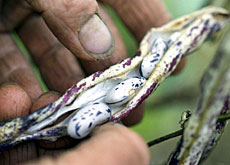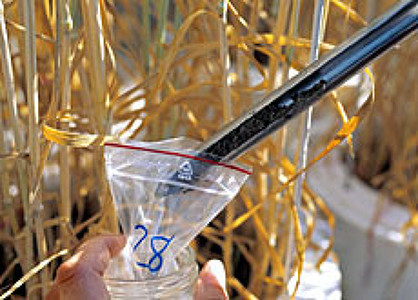Swiss back GM moratorium and Sunday shopping

Voters have given their approval to a five-year ban on genetically modified organisms (GMOs) in Swiss agriculture.
By a wafer-thin majority the electorate also endorsed plans to ease restrictions on Sunday shopping, which had been challenged by trade unions.
Final results show 55.7 per cent of voters approved a people’s initiative put forward by environmentalists and consumers groups for a temporary ban on GMOs in agriculture.
All 26 cantons came out in favour of the moratorium.
It is a rare occurrence in Swiss politics for a people’s initiative to be passed in a nationwide ballot. To do so it requires a majority of the popular vote and the backing of more than half the cantons.
Turnout was average at 42 per cent.
Consumers and research
Supporters of the moratorium, mainly from the political centre-left, said their victory proved the power of the alliance between environmentalists, consumer organisations and farmers.
In their campaign they had argued that GMOs are neither in the interest of consumers nor of Swiss farmers, and that a moratorium is an opportunity for farmers to improve their marketing or organic products.
The government, the business community as well as the main centre-right and rightwing parties were all against the temporary ban.
They said the current law contains enough safety guarantees and a ban could be detrimental to biotechnology research in the country.
Campaigners for a moratorium said they were not opposed to research but wanted more time to consider the potential risks of GMOs.
The ballot on the GMO moratorium comes after parliament passed a new law in 2003, which allows GM crops in Switzerland under certain conditions.
Speaking on behalf of the Swiss government, Economics Minister Joseph Deiss said he accepted Sunday’s ballot-box decision, and confirmed that the five-year moratorium would come into effect from Monday.
Urban centres
In a separate vote, the Swiss narrowly approved an amendment to the labour law aimed at easing restrictions on Sunday trading at the country’s main railway stations and airports.
Final results show 50.6 per cent of voters – predominantly in seven urban regions – approved the legislation, with 49.4 per cent against.
Deiss welcomed the outcome of the vote but warned against hasty steps towards a further liberalisation of Sunday trading.
The trade unions, supported by the centre-left Social Democrats and the country’s main churches, had mounted a challenge to the revised legislation. They are concerned relaxed regulations will lead to a seven-day working week.
Three of the main centre-right and rightwing parties, as well as the business community argued that there was growing consumer demand for shops to open on Sundays.
Shops in Switzerland usually remain closed on Sundays and public holidays but numerous exceptions have been introduced, mainly in tourists areas, at service stations, airports and railway stations.
swissinfo with agencies
A proposal for a moratorium on GMOs in Swiss agriculture was accepted by 55.7% of voters and all 26 cantons.
It is only the 15th people’s initiative in modern Swiss history to be passed at the ballot box.
The revised labour law, aimed at easing restrictions on Sunday shopping at railway stations and airports, won the approval of 50.6% of voters, mainly in urban regions.
Turnout was average at 42%.

In compliance with the JTI standards
More: SWI swissinfo.ch certified by the Journalism Trust Initiative










You can find an overview of ongoing debates with our journalists here . Please join us!
If you want to start a conversation about a topic raised in this article or want to report factual errors, email us at english@swissinfo.ch.